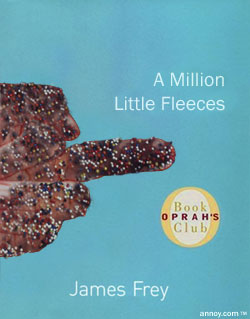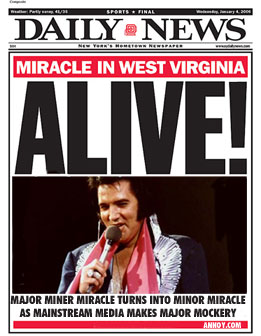Friday, January 27, 2006
A Million Little Fleeces
 Whilst not strictly a First Amendment issue, the controversy raging over Oprah Winfrey's surprising defense of author James Frey, by calling in to CNN's cartoonish Larry King, culminated in a public apology yesterday by Winfrey.
Whilst not strictly a First Amendment issue, the controversy raging over Oprah Winfrey's surprising defense of author James Frey, by calling in to CNN's cartoonish Larry King, culminated in a public apology yesterday by Winfrey.Winfrey's own First Amedment history relating to the beef industry, as well as the greater debate as to what distinguishes fact from fiction, opinion from reporting and other such "thin lines" makes the debate relevant here.
For those living in a bubble -- or outside America -- in a nutshell, James Frey cooked up a story called A Million Little Pieces, which was apparently rejected by his publisher as a fiction, and subsequently repackaged as a memoir. Not to be confused with an autobiography, which suggests a factually accurate, verifiable recalling of events, but simply a memoir, which is a non-fictional, but far less scrutinized recalling of events by the author. What Comedy Central’s Stephen Colbert might call “truthiness.” (Add that word to your word-processing dictionary). Memoirs sell better than fiction does.
The enterprising sleuths at the web site The Smoking Gun on a quest to find Frey’s mugshot to add to their considerable collection of celebrity mugshots, found themselves ensconced in a six-week investigation, uncovering details that made James Frey’s memoir as an alcoholic, drug addict, and criminal as convincing a non-fiction as the White House propaganda that prompted the Patriot Act and apparent congressional relinquishing of their role as a constitutional balance of power.
What made the story even more juicy, is that America (with a literacy rate, incredibly, of 97% according to the CIA) was induced to read a book by Winfrey’s powerful book club, arguably the most powerful there is, which shot it straight to the top of the New York Times (and every other noteworthy) best-seller list.
What bothered me most about Oprah’s defense of James Frey was compounded by a recent profile in Newsweek in which Oprah, in her words, attributed her entire success as a woman to being truthful. I readily admit that there is no one truth and that truth, in and of itself, is a subjective concept, but the distinction between one’s perceived truth and a blatant embellishment is clear enough. A redemption tale presented as a factual account but predicated on lies and embellishments is far less inspiring than a fictionalized tale presented as such.
Winfrey’s defense of Frey on Larry king bothered many, including yours truly, who included references to it in my Cry-Baby piece, featuring Martha-Ann Alito and disgraced congressman, Randy “Duke Cunningham”. Some felt it was much ado about nothing.
In addition to frying Frey, Winfrey attacked Doubleday publisher Nan Talese, who seemed to wither under Winfrey’s relentless showdown, (enhanced by a televised appearance of a smug, purse-lipped New York Times columnist, Maureen Dowd, wagging an accusatory finger at all concerned, urging Winfrey to withdraw the endorsement of her book club.) Doubleday, later released an apology.
However, cynical as I am, Oprah Winfrey redeemed herself yesterday, and restored her credibility. She is the first American public figure in the eighteen years I’ve been in the country that was so quick and so unequivocal in admitting she was wrong, had made a mistake, and was sorry about it. It’s so unbelievably rare and refreshing I am surprised at how quickly my scorn and cynicism turned to forgiveness and appreciation. She may be a lot of things, and her quest for publicity may be all-consuming, but authenticity is authenticity, and she deserves a hat tip here.
James Frey -- his long-drawn, stumbling, piecemeal confession in the wake of some fine investigative journalism by the The Smoking Gun notwithstanding -- on the other hand, doesn’t quite have the balls.
The truth in a memoir is not quite the same as the truth from our government. With cooked intelligence leading to a pre-emptive war, domestic eavesdropping, a culture of absolute corruption, the leaking of names of CIA operatives and a media culture that makes it impossible to differentiate the National Enquirer from the Los Angeles Times, are we simply being distracted yet again?
Thursday, January 26, 2006
Fudgepack in the Morning
Notoriously homophobic, Imus and his gang (including the equally unconvincing heterosexual sidekick Bernie McGuirk and the ever effete Charles McCord) have resorted to calling the movie Fudgepack Mountain (which of course, made GLAAD hysterical, following an exchange where MSNBC’s slobbering pantywaste, Chris Matthews, and Imus segued from a manly discussion about their weighty hips to discuss the gay cowboy movie).
The wit in this sophomoric insult was so subtle that it could only be communicated through repletion, again today – Imus screeching, “Fudgepack Mountain, Fudgepack Mountain, Fudgepack Mountain” to NBC’s Andrea Mitchell. Mitchell, whose sole experience in male sexuality is garnered from fucking (or not) the oh-so-virile Alan Greenspan for the last eighty years or so. Do these MSNBC anchors have no self-respect?
Imus, McGuirk and your girly gaggle of hanger-ons, it’s this simple. You don’t want to see a movie that is about two guys who are in love, and yes, (whether GLAAD wants to acknowledge it or not), fuck each other, bareback in a tent, don’t go.
Who cares? Jesus Christ, like the whole world gives a shit that little Bernard McGuirk is going to have to look in the mirror and deal with his unspeakable woody over two guys getting it off. Get a life dudes. Fuck your wives a little harder, if you must, if you think that will help your fixation -- Deirdre Imus kind of looks like a male version of Laura Ingraham anyway – but for those of us who are secure in our sexuality, frankly, the only things unsexy about the notion of Fudgepack Mountain are the hysterical, homophobic closet cases shrieking about it.
See also:
Who Is the Bigger Homophobe?
Pushback Mountain
Saturday, January 21, 2006
Of Mice and Cowards
 In 2001, the ERLC's [Ethics & Religious Liberty Commission] annual report called for Disney to cease its promotion of "Gay Days" at its theme parks; halt the publication of pro-homosexual books; refrain from advocating the "radical homosexual agenda" through its broadcast venues; and "establish an advisory committee of Southern Baptists and other evangelicals" to provide Disney "advice and counsel" on their entertainment projects. (The accompanying image by Clinton Fein was created in 2001.)
In 2001, the ERLC's [Ethics & Religious Liberty Commission] annual report called for Disney to cease its promotion of "Gay Days" at its theme parks; halt the publication of pro-homosexual books; refrain from advocating the "radical homosexual agenda" through its broadcast venues; and "establish an advisory committee of Southern Baptists and other evangelicals" to provide Disney "advice and counsel" on their entertainment projects. (The accompanying image by Clinton Fein was created in 2001.)
Now, five long years later, ABC executives have canceled "Welcome to the Neighborhood" – a reality show about a gay couple and their child that moves into a neighborhood whose residents “overwhelmingly identified themselves as white, Christian and Republican.”
According to the New York Times, ABC claims to be “concerned that viewers who might have been appalled at some early statements made in the show - including homophobic barbs - might not hang in for the sixth episode.”
In an annual letter to shareholders in 1998, Walt Disney Chairman Michael Eisner said he "always will defend the right" of the company to make entertainment that some might find offensive." He also pledged to "fight attempts by groups like the Southern Baptist Convention to change the content of Disney products."
Not only is the current act of cowardice the weakest cop-out imaginable – but when ABC’s decisions are applauded by the likes of James Dobson and Gary Bauer (with their barely-veiled threats to derail evangelical Christian support for "The Chronicles of Narnia: The Lion, the Witch and the Wardrobe"), it’s obvious that greed trumps anything else, and the sniveling little rodent still has no balls.
Thursday, January 12, 2006
Toying with Annoying
 The interest in this story has been so phenomenal that I have added some additional updates, and will likely add more as time goes on.
The interest in this story has been so phenomenal that I have added some additional updates, and will likely add more as time goes on.The annoying thing about hastily and ill-crafted legislation is that it forces one to be pedantic, muddying rather than clarifying the law, inviting legal challenges and outright violations. Remember, it depends what is is.
Assuming for argument’s sake that this law is designed to deal solely with conduct rather than content issues, so its not that someone sends you content you find annoying, but sends it hundreds of times, which you find annoying.
If the language as amended above is to be taken on its face, the first problem is with the word utilizes, since it doesn’t clarify whether utilizing it has to be for its intended telecommunication purpose.
Loudly setting off the alarm of my cell phone every two minutes whilst attending a ballet doesn’t change the fact that the device CAN BE USED to originate communications that are transmitted, in whole or in part, by the Internet. Or that I have not revealed my identity. Or that I have not annoyed many people. Similarly, if I was to hold up my cell phone, displaying an aborted fetus as the background image, and point it at doctors entering or leaving an abortion clinic, without revealing my identity, would that constitute *utilizing* a prohibited device and thus a felony?
And if one is to assume that the device or software must indeed be used to *originate* telecommunications or other types of communications that are transmitted, in whole or in part, by the Internet, then the question of what is transmitted becomes unclear. With Annoy.com postcards, for instance, the sender uses the service to create a message which is then published on Annoy.com’s servers and inaccessible to the public. What is actually transmitted to the recipient is a notification that they have been sent a communication and provides them with a unique key that allows them to retrieve it if they so choose.
In fact, with CNet, I was able to forward their very article to me, containing theoretically annoying content by spoofing Arlen Specter, and CNet (like most news publications that facilitate emailing content, but unlike Annoy.com) actually sends the self-generated content in the email notification itself, only linking to the story.
Ironically, a remaining provision of the CDA is what actually protects third party content providers, and since Annoy.com does not monitor or approve postcards, and therefore intent cannot be established, prosecution is unlikely. Annoy.com’s overall stated intent to annoy is content based.
Nonetheless, I believe the law requires too many assumptions and remains vague enough to warrant a constitutional challenge.
ADDITIONAL LINKS
FAQ: The new 'annoy' law explained
CNet
Janaury 11, 2006
Declan McCullagh clarifies...
Perspective: Create an e-annoyance, go to jail
CNet
Janaury 11, 2006
Declan McCullagh's Original Article
Monday, January 09, 2006
With Intent to Annoy!
 On today's CNet, Declan McCullagh commented on congress' newly passed law, insidiously buried in the Violence Against Woman and Department of Justice Reauthorization Act, which criminalizes the sending of annoying email messages without disclosing your true identity.
On today's CNet, Declan McCullagh commented on congress' newly passed law, insidiously buried in the Violence Against Woman and Department of Justice Reauthorization Act, which criminalizes the sending of annoying email messages without disclosing your true identity.Buried deep in the new law is Sec. 113, an innocuously titled bit called "Preventing Cyberstalking." It rewrites existing telephone harassment law to prohibit anyone from using the Internet "without disclosing his identity and with intent to annoy."
For the last nine years I have owned and run Annoy.com, which among other things contains a postcard service that allows people to send postcards without being required to furnish their identity. Not unlike most news organizations that allow you to use "Send to a friend" features to distribute their content and enable you to include a message (possibly an annoying one) or the United States Postal Service, which allows you to send any content (even annoying to some people) by simply requiring a stamp. No identity checks at the local corner post box. Yet.
On January 30, 1997, I filed a federal court action seeking declaratory and injunctive relief challenging the provisions of the Communications Decency Act (CDA) of 1996 that criminalize any "indecent" computer communication intended to "annoy" another person.
The Justice Department did not attempt to defend the provisions as written. Instead, Attorney General Reno argued that the statute did not criminalize "indecent" speech at all, only "obscene" material. She represented to the court numerous times that the Justice Department would not and could not prosecute ApolloMedia for communicating merely "indecent" material. She persuaded the three-judge court to adopt her statutory interpretation.
The government's argument - that was bought by both the Ninth Circuit and the by the United States Supreme Court to whom I appealed - was that the string of words indecent, lewd lascivious, filthy and obscene, all only meant obscene and that congress was not trying to criminalize indecent speech, even if it was annoying.
However, obscenity, which is not protected by the First Amendment, would remain unprotected, essentially rendering the intent provision useless. Obscenity is not protected regardless of whether intended to annoy or not.
Although this new law is not clear, it appears similar to how the Communications Decency Act broadened §223 beyond telephones to communications transmitted by computer, restricting a medium that is significantly less intrusive than the telephone. A ringing telephone intrudes into private space and carries the ability to harass or annoy even if no content is communicated, especially when the calls are repeated or come in the middle of the night. But computer communications are silent and, importantly, they are read only if the recipient chooses to read them.
It appears, with Sec. 113, that one is guilty of a crime if one were simply to "utilize" a telecommunications device "with intent to annoy" a person. Regardless of the content, or even in its absence. A conduct rather than a content crime. Perhaps waving a Blackberry in someone's face. Or annoying someone by using their cell phone as a vibrator.
Let's assume for a minute that the new law is based on not only conduct but speech as well. In 1973, the Supreme Court attempted to define obscenity in Miller v. California, 413 U.S. 15, 24 (1973), by establishing a three-part test for obscenity: "hard core" sexual material that appeals to the prurient interest; is patently offensive under community standards; and lacks serious literary or other value. Each of the three parts of the Miller test must be met to criminalize even obscene speech.
Assuming it was possible to actually define content as annoying (perhaps unanimous agreement by Rush Limbaugh and Al Franken) using a similar standard to Miller, how on earth do you decide whether, when or where a particular piece of content is annoying? Is it annoying in a particular community?
Perhaps an annoyingly erroneous news dispatch on the cover of the New York Post in Sago, West Virginia might be more annoying there than it would be to the poor person reading it as fact on the subway in Manhattan. And therefore, if someone chose to send the story anonymously to Rupert Murdoch, expressing their outrage, which community would decide the appropriate level of content annoyance to legitimize a federal lawsuit by Mr. Murdoch?
Further, assuming it was determined that the content was likely annoying enough to Mr. Murdoch in Manhattan, would the content become less annoying if Mr. Murdoch was to sip on a scotch, smoke a joint or pop a Xanax?
And what exactly constitutes the annoyance. Is it the fact the email was sent to him at home rather than the office? Or that it was sent by Ted Turner? Or whether the sender's intent was to gloat at Murdoch's mistakes, or communicate them in the hope he remedy them?
Like the difficulty inherent in defining the "prurient interest" part of the obscenity provision, the notion of annoyance lies within the eyes and mind of the beholder, not the content. Because I find Christmas songs annoying, doesn't mean the songs are annoying. It means I find them annoying. Similarly, that the recipient of an email is annoyed does not necessarily mean that the sender intended for the communication to be annoying, and would a felony be an appropriate punishment for someone who intended to annoy the recipient but was unsuccessful, instead making the recipient laugh?
Another huge problem with this legislation is that it fails to take into account the different types of electronic communications available. As McCullagh points out, you can flame someone on a mailing list or in a blog, so long as you do it under your real name.
Then there's enforcement. On June 17, 1999, I received an order entered by the Honorable Marcia A. Crone (Under 18 U.S.C. § 2703(D), a Texas magistrate, requiring me to produce records pertaining to the sender of certain email messages from Annoy.com's postcard service within three days, along with an order not to "disclose the existence of the United States' application or [the] order, or the existence of any investigation" to the sender of the email messages "or to any other person" until further order by the Court."
Essentially, I was being told to turn over the identity of people, for whom, as far as I knew, there was no evidence had committed any crime, who had sent communications using Annoy.com and who had a reasonable expectation that their communications were not being scrutinized by the government. And to shut up about it.
Even creepier, was the fact that the "privacy" argument the government used to impose the gag order on me, was to protect the identity of the alleged victim, although the victim and any information pertaining to her was under seal, inaccessible to me or anyone else.
Since I was unable release the identity of the sender with any degree of certainty, and was not prepared to release all of ApolloMedia's records, I could not comply, but turning the tables against the United States, sought to have the record unsealed to see if I, or Annoy.com, was under investigation, and to remove the overly broad and unconstitutional gag order, which represented an unconstitutional prior restraint.
Before their final defeat in oral argument before the U.S. Court of Appeals for the Fifth Circuit in New Orleans, the government sought to retain the gag insofar as it pertains to releasing the identity of the alleged victim in the criminal investigation that launched the case (which had been declared inactive by that stage). They also sought to prevent me from making mention of the institution - the University of Houston - involved in the unmasking of an anonymous identity and upon whose behest they supposedly were acting. They were unsuccessful. The record was unsealed and the gag order was removed.
With the help of my attorneys, my hard fought victory to prevent undue governmental secrecy while protecting and balancing both the public's right to know and an individual's privacy is one of which I am extremely proud.
The current legislation passed by congress is unconstitutionally vague and not worthy of the institutions and their members we elect to protect our constitutional freedoms. Although I am still assessing the future of Annoy.com's specific role in relation to this legislation, I remain committed to exercising the freedom for which I, and so many before me, have worked so hard to ensure.
Wednesday, January 04, 2006
The Coal Miners Slaughter
 There’s no denying that the mining disaster in Sago, West Virginia was a tragedy. And there’s no denying the pain and anguish that relatives, friends and loved ones of the victims must have felt, particularly after rumors that all but one of the miners had been found alive circulated – only to be crushed three long hours later, turning jubilation into sorrow, anger and fury.
There’s no denying that the mining disaster in Sago, West Virginia was a tragedy. And there’s no denying the pain and anguish that relatives, friends and loved ones of the victims must have felt, particularly after rumors that all but one of the miners had been found alive circulated – only to be crushed three long hours later, turning jubilation into sorrow, anger and fury.But from the beginning, the evocation of miracles by Governor Joe Manchin III, Bennett K. Hatfield, the chief executive of International Coal Group, the mine's owner, and many in the media set the stage for disappointment.
A miracle is essentially defined as a marvelous event manifesting a supernatural act of God. The rumors that first circulated suggested that all of the miners except for fire boss, Terry Helms, whose body was discovered first, had been found alive. It must have been awful for the family of Terry Helms to listen to the jubilation of the other families, officials and news media and wonder what their family member had done that would separate him from the list of those for whom God decided were worthy of a miracle.
As the news media gushed on about miracles, from a breathless CNN’s Anderson Cooper to a wheezing Rita Cosby on MSNBC, it seemed that God still had one or two nasty tricks up his sleeve. Their atrocious display of almost instant piety following the emergence of the truth completely ignored their own role in fueling the rumors, let alone failing to verify the truth from official channels before reporting it as fact or exercising a iota of caution.
Except for reporter Becky Wagoner with local The Inter-Mountain newspaper of Elkins, W.Va. who told Editor & Publisher:
"A lot of the media left to go to the church where family members were located, but I stayed put because this was where every official news conference was given--and we never got anything official here," she said. "Something was not right. Then we were hearing reports that 12 ambulances had gone in [to the mine area] but only one was coming out. There was so much hype that no one considered the fact that there was no [official] update."
Live broadcast coverage is not the only culprit. A failure to check the veracity of the reporting did not stop newspapers like USA Today either. As blogger Freedom Rider pointed out:
"Today the Times hedged, a little, but not enough. Their version of bad reporting was '12 Miners Found Alive, Family Members Say.' They were a tiny bit better than the New York Post and Daily News. Their headlines screamed, ALIVE!, MIRACLE! Perhaps tomorrow they will say OOPS! or IS OUR FACE RED!."
Even after the truth emerged, the use of the word miracle by officials continued to dominate their language. "Despite our grief and despair at the loss of our 12 co-workers, we want to celebrate the one miracle that was delivered," said Bennett Hatfield in reference to the one remaining survivor, miner Randal McCloy Jr.
In fact, Governor Manchin's incessant use of the word miracle is what contributed to the confusion and miscommunication. The New York Times reports that according to the Governor's aides, "on his way to the command center the governor was asked 'Is it a miracle?' and responded 'Yes, miracles can happen.' But while friends and family members who were at the scene last night said today that the governor had been part of the confusion, none of the abundant anger was directed at him."
From the Pentagon this morning, President Bush said:
“We send our prayers and heartfelt condolences to the loved ones whose hearts are broken. We ask that the good Lord comfort them in their time of need.”
If He was the one responsible for bestowing and then revoking the miracles to begin with, the question is, why would He offer comfort now? And if this is indeed the work of God, why bother investigating International Coal Group?
It’s time for public officials to comment on and for the media to report on facts, and facts alone, and leave evocations of miracles, God and the supernatural to the privacy of those who have faith in them. Apparently, miracles do happen.



